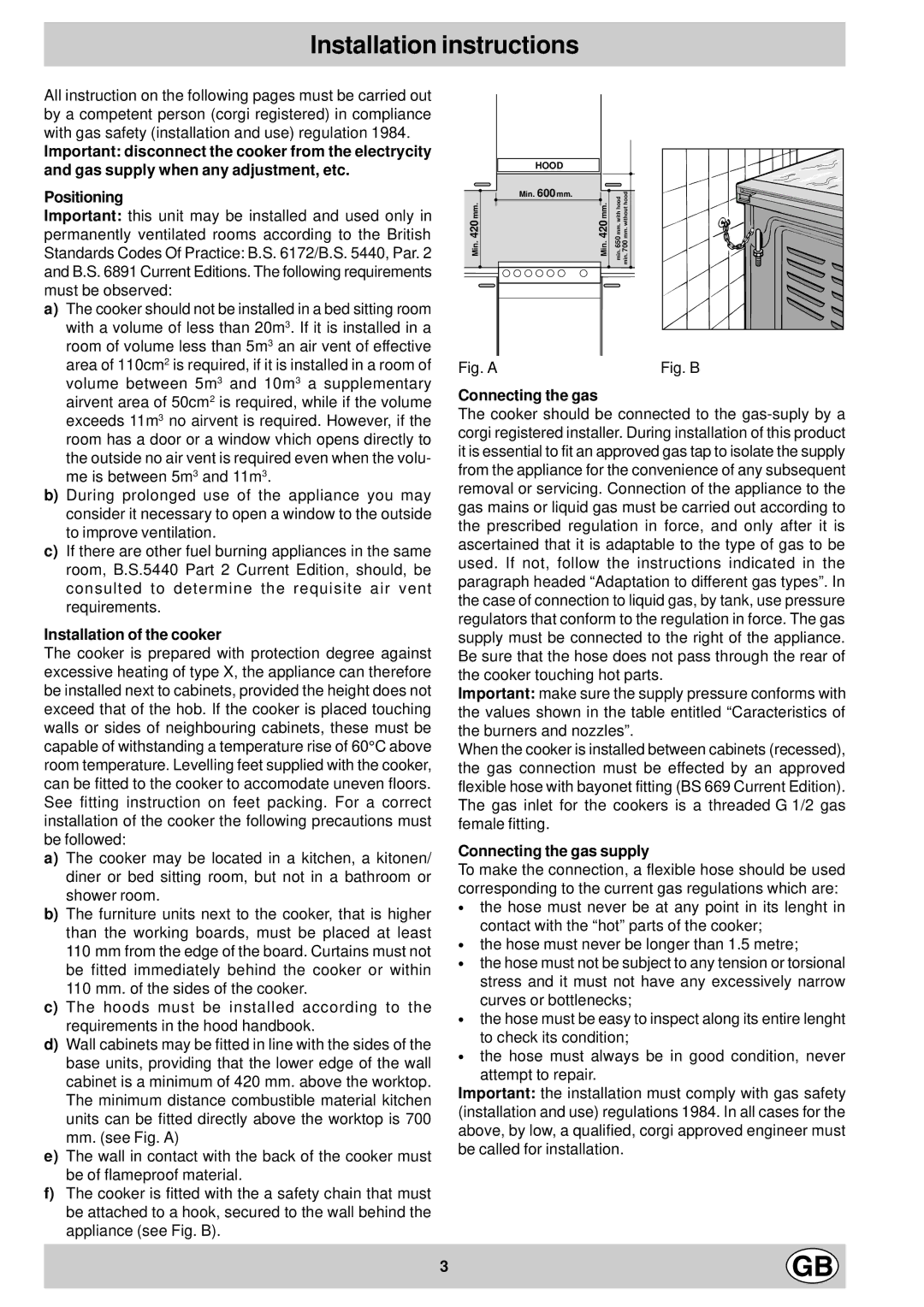
Installation instructions
All instruction on the following pages must be carried out by a competent person (corgi registered) in compliance with gas safety (installation and use) regulation 1984.
Important: disconnect the cooker from the electrycity and gas supply when any adjustment, etc.
Positioning
Important: this unit may be installed and used only in permanently ventilated rooms according to the British Standards Codes Of Practice: B.S. 6172/B.S. 5440, Par. 2 and B.S. 6891 Current Editions. The following requirements must be observed:
a)The cooker should not be installed in a bed sitting room with a volume of less than 20m3. If it is installed in a room of volume less than 5m3 an air vent of effective area of 110cm2 is required, if it is installed in a room of volume between 5m3 and 10m3 a supplementary airvent area of 50cm2 is required, while if the volume exceeds 11m3 no airvent is required. However, if the room has a door or a window vhich opens directly to the outside no air vent is required even when the volu- me is between 5m3 and 11m3.
b)During prolonged use of the appliance you may consider it necessary to open a window to the outside to improve ventilation.
c)If there are other fuel burning appliances in the same room, B.S.5440 Part 2 Current Edition, should, be consulted to determine the requisite air vent requirements.
Installation of the cooker
The cooker is prepared with protection degree against excessive heating of type X, the appliance can therefore be installed next to cabinets, provided the height does not exceed that of the hob. If the cooker is placed touching walls or sides of neighbouring cabinets, these must be capable of withstanding a temperature rise of 60°C above room temperature. Levelling feet supplied with the cooker, can be fitted to the cooker to accomodate uneven floors. See fitting instruction on feet packing. For a correct installation of the cooker the following precautions must be followed:
a)The cooker may be located in a kitchen, a kitonen/ diner or bed sitting room, but not in a bathroom or shower room.
b)The furniture units next to the cooker, that is higher than the working boards, must be placed at least 110 mm from the edge of the board. Curtains must not be fitted immediately behind the cooker or within 110 mm. of the sides of the cooker.
c)The hoods must be installed according to the requirements in the hood handbook.
d)Wall cabinets may be fitted in line with the sides of the base units, providing that the lower edge of the wall cabinet is a minimum of 420 mm. above the worktop. The minimum distance combustible material kitchen units can be fitted directly above the worktop is 700 mm. (see Fig. A)
e)The wall in contact with the back of the cooker must be of flameproof material.
f)The cooker is fitted with the a safety chain that must be attached to a hook, secured to the wall behind the appliance (see Fig. B).
HOOD
| Min. 600 mm. | min. 650 mm. with hood min. 700 mm. without hood |
Min. 420 mm. | Min. 420 mm. |
Fig. A | Fig. B |
Connecting the gas
The cooker should be connected to the
Important: make sure the supply pressure conforms with the values shown in the table entitled “Caracteristics of the burners and nozzles”.
When the cooker is installed between cabinets (recessed), the gas connection must be effected by an approved flexible hose with bayonet fitting (BS 669 Current Edition).
The gas inlet for the cookers is a threaded G 1/2 gas female fitting.
Connecting the gas supply
To make the connection, a flexible hose should be used corresponding to the current gas regulations which are:
∙the hose must never be at any point in its lenght in contact with the “hot” parts of the cooker;
∙the hose must never be longer than 1.5 metre;
∙the hose must not be subject to any tension or torsional stress and it must not have any excessively narrow curves or bottlenecks;
∙the hose must be easy to inspect along its entire lenght to check its condition;
∙the hose must always be in good condition, never attempt to repair.
Important: the installation must comply with gas safety (installation and use) regulations 1984. In all cases for the above, by low, a qualified, corgi approved engineer must be called for installation.
3
